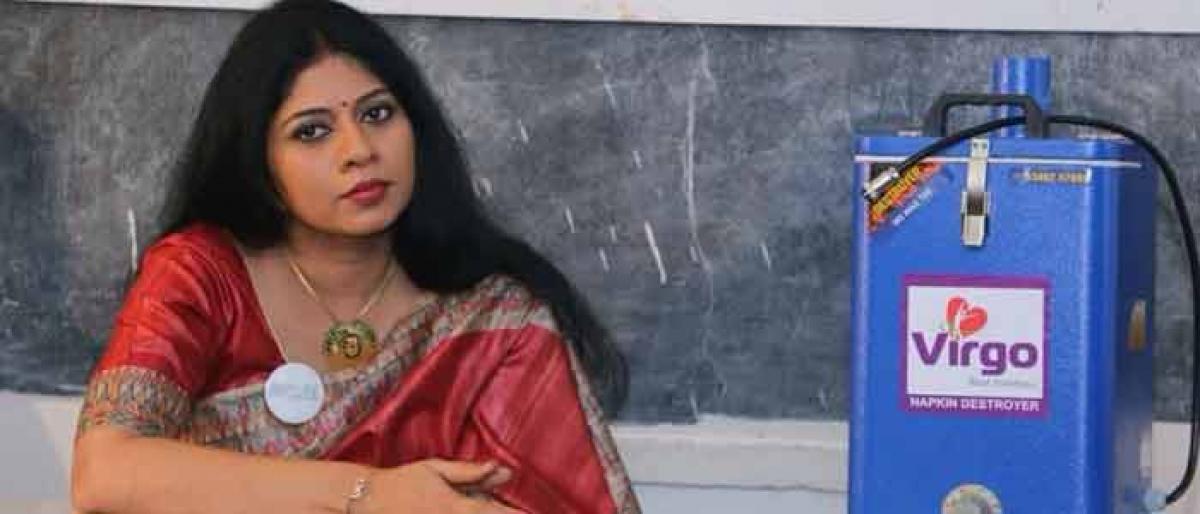Live
- ‘Kuppam Gadda-TDP Adda’, asserts Bhuvaneswari
- Never made people regret voting for me: Kishan Reddy
- ‘Garuda Prasadam’ at Chilkur Balaji throws traffic haywire on Moinabad Road
- GHMC approves 11,000 building permissions
- Members of Legislative Council Join YSR Congress Party in Massive Election Campaign in Buchireddypalem Mandal
- YV Ramireddy Criticizes MLA Sridhar Reddy for His Comments on Adala Prabhakar Reddy
- Visakhapatnam: Amid special prayers and bike rallies, candidates file nominations
- AIMIM works for its own welfare, neglects Old City denizens
- Palle Sindhura Reddy flays YS Jagan during election campaign in Puttaparthi
- Senior JSP leader Manukranth Reddy quits party, joins YSRCP
Just In

The recent release of Akshay Kumar starrer ‘Padman’ and the spearhead campaign of the Miss World, 2018, Manushi Chillar, about the use of sanitary hygienic Pads has accelerated the discussion on menstrual hygiene. The discussion is bringing to light various organisations that are already working towards creating awareness.
The recent release of Akshay Kumar starrer ‘Padman’ and the spearhead campaign of the Miss World, 2018, Manushi Chillar, about the use of sanitary hygienic Pads has accelerated the discussion on menstrual hygiene. The discussion is bringing to light various organisations that are already working towards creating awareness.
One such initiative is ‘PURE’ that focuses on bringing awareness in menstrual hygiene in underprivileged children attending government schools and hostels in Telangana and Andhra Pradesh by manufacturing low-cost bio-degradable sanitary pads.
“Over 26,000 girls have gained access to low cost pads through PURE and it aims to reach 250000 girls by 2020”, says Shyla Talluri, founder. The PURE team travels to rural, tribal and suburban schools to conduct workshops on menstrual hygiene and facilitate easy access to discounted bio- degradable napkins for Rs 5 per pair. The distribution of pads is happening through installation of vending machines and Incinerators/napkin destroyers for easy disposal. Their main focus is to empower rural girls to use them.
Going back to her adolescent days, Shyla shares, “I personally had a rough adolescence with having to skip school due to heavy periods and falling back in studies. Being stared at in supermarkets while comparing different sanitary products, I was told not to go buy the napkin myself and brother or dad were sent to buy the pads for me. I always feared white uniforms on Saturdays.”
She says that lack of facilities in school, like toilets, disposal options and non-access to affordable sanitary products is the reason for considerable fall in girl’s attendance and some even dropping out of school once they hit puberty. Girls who use cloth do not know what to do with it if they attend school.
Their approach was welcomed by the school teachers and girl students as well. Interestingly, male teachers in their 30s are very cooperative. In most cases they are the ones reaching out to PURE with requests to conduct workshops. Female teachers in the age group of 30 -45 years are open to a dialogue on the topic. However, more than half of the female teachers are embarrassed to raise the subject or partake in discussions in the presence of men, she throws light on the topic being still considered a taboo.
Girls in hostels are happy about the affordability of the products and they gave a boost to the organisation. However, Girls in rural schools are slow in adapting to the hygienic pads as they live with their family and act under their influence. They skip school during periods due to lack of cloth. There are instances where all female members of the family share the rags. The rags are washed hurriedly and dried in shade under something to keep it off from public view, she points.
PURE conducts workshops that include one-hour session with school staff, two-hour interactive session with class 5-10 girls about why and what is periods, changes in body, options to manage periods with dignity – the concept of reusable and disposable, the taboos, cleanliness, usage & disposal of pads, importance of education and voicing concerns/standing up to abuse. There are also few sessions that include class 8 to 10 boys, if the school offers co-education. They teach about puberty, basics about periods, and on how to respect fellow students.
Currently, PURE has one unit functioning with four women and four physically/mentally challenged persons. They also take support from other self-help groups to conduct more workshops. In order to reach the target of reaching 250000 girls by 2020, PURE is mulling plans to start four units in the two Telugu states, in coalition with Save The Child and Asha Jyothi, USA.

© 2024 Hyderabad Media House Limited/The Hans India. All rights reserved. Powered by hocalwire.com







